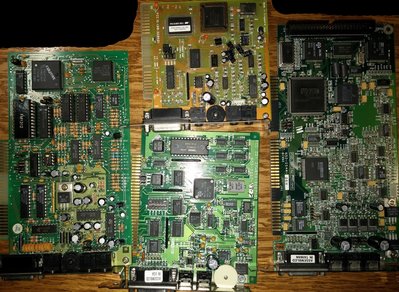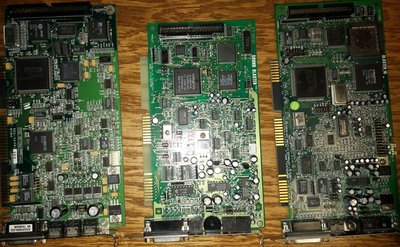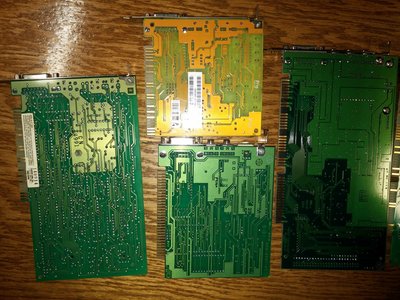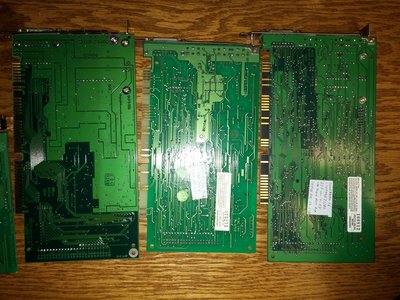First post, by Ozzuneoj
- Rank
- l33t
This has me pretty much baffled. I'm going to keep it short.
Short Version:
In my 386 system my SB Pro2 CT1600 and CT1740 work fine. SB 2.0 CT1350B, MediaVision Thunderboard and Aztech SoundGalaxy BXII (8bit card) all give me no FM music or sound other than a static\buzzing sound when the speakers are turned up high and it does not change with activity on the computer. All are set to IRQ5 and address 220, just like the CT1600 and CT1740. MediaVision PAS16 is not detected at all by several DOS installation programs and will not work at all. Tried with both an original AT power supply and a modern one with an AT-ATX (with -5v) converter, same problem. All of the 8bit cards work flawlessly in a PII 400Mhz system (using an ATX 24pin to ATX 20pin with -5v converter). Originally thought it was related to the OSC clock pin, but I'm unsure since the CT1740 has this pin as well and it is connected to something.
DTK Datatech AM386SX 33Mhz Motherboard with 128KB cache installed (More info about this board here)
Diamond Speedstar VGA Tseng ET4000AX
SIIG Enhanced IDE card (with the Parallel port set to IRQ7, floppy and 1.2GB hard drive installed)
350W Seasonic 80 Plus Bronze PSU with ATX to AT converter (with -5v added)
Long version:
I can't get any 8bit soundcards (and some others) to work in this system! I don't think it's caused by a resource conflict because an SB Pro2 CT1600 works fine with the same IRQ and IO port settings. I can boot from the hard drive to DOS 6.22, I can use a Parallel to CF reader for external storage and everything works fine except that I get no sound in any games when using any 8bit cards. I've tried my CT1350B, MediaVision Thunderboard and an Aztech SoundGalaxy BXII and they all give me random buzzing and static. All are set to IRQ5 and address 220, just like the CT1600.
I thought maybe it was related to some of the cards requiring -5v (I'm using a modern ATX PSU with one of the adapters that adds -5v), but using an ISA tester card it shows -5v as being there and I can use my DMM on the -5v test points and it is showing about -4.85v. Last week when I first noticed the issue with the CT1350B I tried using an old AT PSU and had the same problem, so it really doesn't seem to be -5v related. Also it doesn't look like the -5v pin on the Thunderboard is connected to anything so that definitely rules that out for that card. I just tested the CT1350B in another system (also using a -5v adapter on an ATX PSU) and it works flawlessly with no setup required... CMS and FM both work.
I just tried a PAS16 in my 386 and the installer simply says that no Pro AudioSpectrum 16 is detected. Also tried the PAS Studio drivers and had the same problem. I know that the PAS16 does require -5v, but from what I gather it only affects the audio output. Not having -5v shouldn't disable the card completely... plus, as mentioned, I've already tested the -5v right at the ISA slot and it is there.
The only other thing I can tell that is different between the working and non working cards is that ALL of the ones that are not working use the OSC pin on the ISA connector. The SB Pro2 does not use this. I'm just about hitting the limits of my knowledge, but I guess allows a card to get its clock from the motherboard, rather than a clock on the card. I thought I'd found the problem when I saw that the solder joints on the legs of the 14.31818Mhz crystal on my board were looking a bit sad, so I reflowed them with my iron and some flux (they look perfect now)... and it still doesn't work. I still get the same low, growly, static noise. The volume of the noise is affected by the volume pot on the cards as well.
I'm at a loss. What would cause something like this? Is it likely a hardware fault? Where would I start to diagnose it? I do own an oscilloscope, but I don't really know how to use it. If that could help fix a clock related problem, I'll give it a shot.
Now for some blitting from the back buffer.



